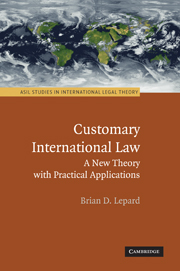Book contents
- Frontmatter
- Contents
- Figures
- Acknowledgments
- Cases
- PART ONE THE ENIGMAS OF CUSTOMARY INTERNATIONAL LAW
- PART TWO FOUNDATIONS OF A NEW THEORY OF CUSTOMARY INTERNATIONAL LAW
- PART THREE RESOLVING THE CONCEPTUAL ENIGMAS OF CUSTOMARY INTERNATIONAL LAW
- PART FOUR RESOLVING THE PRACTICAL ENIGMAS OF CUSTOMARY INTERNATIONAL LAW
- 12 General Sources of Evidence of Opinio Juris
- 13 The Role of Treaties as Evidence of Opinio Juris
- 14 The Role of United Nations General Assembly Resolutions as Evidence of Opinio Juris
- 15 The Role of Consistent State Practice
- 16 The Persistent Objector Exception
- 17 Defining Jus Cogens Customary Norms
- 18 Defining Erga Omnes Customary Norms
- 19 Resolving Conflicts with Treaties
- 20 Changing Customary International Law and the Role of International Organizations
- PART FIVE SOME APPLICATIONS OF THE THEORY
- PART SIX THE FUTURE OF CUSTOMARY INTERNATIONAL LAW
- Bibliography
- Index
15 - The Role of Consistent State Practice
Published online by Cambridge University Press: 05 June 2012
- Frontmatter
- Contents
- Figures
- Acknowledgments
- Cases
- PART ONE THE ENIGMAS OF CUSTOMARY INTERNATIONAL LAW
- PART TWO FOUNDATIONS OF A NEW THEORY OF CUSTOMARY INTERNATIONAL LAW
- PART THREE RESOLVING THE CONCEPTUAL ENIGMAS OF CUSTOMARY INTERNATIONAL LAW
- PART FOUR RESOLVING THE PRACTICAL ENIGMAS OF CUSTOMARY INTERNATIONAL LAW
- 12 General Sources of Evidence of Opinio Juris
- 13 The Role of Treaties as Evidence of Opinio Juris
- 14 The Role of United Nations General Assembly Resolutions as Evidence of Opinio Juris
- 15 The Role of Consistent State Practice
- 16 The Persistent Objector Exception
- 17 Defining Jus Cogens Customary Norms
- 18 Defining Erga Omnes Customary Norms
- 19 Resolving Conflicts with Treaties
- 20 Changing Customary International Law and the Role of International Organizations
- PART FIVE SOME APPLICATIONS OF THE THEORY
- PART SIX THE FUTURE OF CUSTOMARY INTERNATIONAL LAW
- Bibliography
- Index
Summary
WHAT CONSTITUTES RELEVANT STATE PRACTICE?
In keeping with the analysis of the proper role of state practice developed in Chapter 8 – which is to serve as evidence of opinio juris – it is desirable to adopt a broad definition of “practice.” Virtually any kind of conduct by any agent of a state or international organization has a potential bearing on opinio juris. The weight of a particular kind of conduct as evidence of opinio juris will vary based on the principles discussed previously.
A number of theorists – even those who view state practice as an independent requirement in accordance with the traditional definition of customary law – adopt this wide perspective. For example, Sinclair states, “The better view would appear to be that State practice covers any act or statement made by or on behalf of a State from which its view can be inferred about the existence or content of a rule of international law.” Akehurst asserts, “State practice covers any act or statement by a State from which views can be inferred about international law.” The Restatement (Third) of the Foreign Relations Law of the United States adopts a similarly broad view of state practice to include “diplomatic acts and instructions as well as public measures and other governmental acts and official statements of policy, whether they are unilateral or undertaken in cooperation with other states, for example in organizations such as the Organization for Economic Cooperation and Development (OECD).”
- Type
- Chapter
- Information
- Customary International LawA New Theory with Practical Applications, pp. 218 - 228Publisher: Cambridge University PressPrint publication year: 2010



